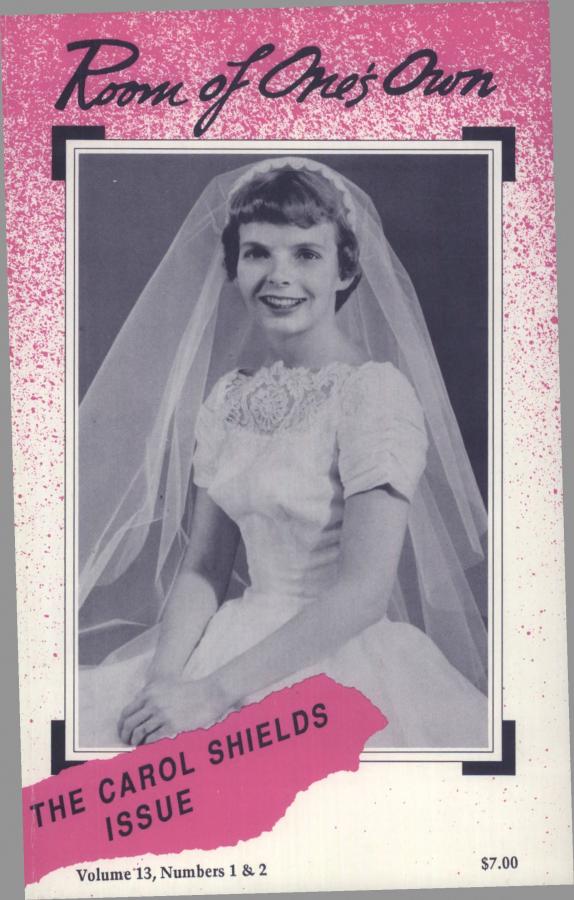ROOM 13.1 & 13.2 Carol Shields
1989
Digital only; out of stock in print.
“Some days Virginia Woolf is the only person in the universe I want to talk to; but she’s dead, of course, and wouldn’t like me anyway. Too flip.” So says Sarah Maloney, twenty-six-year-old feminist scholar in Swann: A Mystery, Carol Shields’ latest novel. Shields says it was harder to project herself into the mind of a modem woman in her twenties than to write with the voice of a man her own age. When Shields herself was twenty-six (in 1961), she was still in a sort of infancy, she claims—”detained too long in girlhood” [A Fairly Conventional Woman). This despite the fact that she already had three children and was living in England, becoming a socialist.
Carol Shields can be self-deprecating, but now, after ten books, she has a kind of assurance in her writing, conscious of how carefully crafted it is, and a confidence, even a slight re sentment, that the work isn’t better known. (The earlier novels are starting to be reprinted and two recent books were just published in the United States. She’s soft-spoken, witty, and very private. Her books are quiet and humane and perhaps because of their primarily domestic circumference, they’re greeted quietly or subtly patronized.
This is what she wrote in a letter a few days after our interview:
Odd to think about the past in such a structured way. It kept me thinking all the rest of the week. One thing that struck me was how little I’ve formulated anything. Where was I when everyone else shaped their theories, beliefs? Drifting along, I suppose. Your question of when exactly I became a feminist espe cially puzzled me, and I’ve more or less decided I’ve always been. That is, I’ve never for a minute doubted the value of women’s experience. Whenever my books met critical scorn because of their subject-mat ter, I just shrugged. Other critical comments I listened to, but not that. When I told you living in England made a socialist of me, I meant that that was when I became active. The exact moment of enlightenment came years earlier in a high school class when a teacher explained about the division of wealth in terms of need. (This was in the McCarthy era and so I was astonished that this was what all the fuss was about. Why, this sounded suspiciously like what I learned in Methodist Sunday school! And it sounded so sensible!) Just one of many double messages float ing around in those days. I think I did recognize the doubleness, but thought it ironic and funny—and couldn’t get too worked up about it.
Four years ago, Shields started to publish work that was different from what she’d written before. It was more whimsical, non-naturalistic, what used to be called “experimental,” but now passes as “post-modern.” It is this that Charles Wilkins responded to in Various Miracles and that he alludes to in his own playful essay here. In a similar vein, Aritha van Herk takes off from Various Miracles and weaves a story of her own, about Shields and the miracle of words.
Donna Smyth and Clara Thomas are fascinated by the mystery of Swann. Smyth had already written about the “middle ground” of Shields’ earlier novels and wanted to tackle “the quantum leap” that is Swann.
Sandy Francis (Duncan) and Kent Thompson offer more personal glimpses of their friendships with Shields.
It isn’t surprising, perhaps, that most writers I contacted chose to engage with the newer work. It is exciting when a writer tries something different while still continuing to care about the ordinary and its own special qualities. After all, it was reading Swann (after reviewing the earlier novels) that gal vanized me into undertaking this issue of Room. I guess any enthusiast feels the writer isn’t getting enough attention, that living in Winnipeg has left Shields somehow invisible under a snowbank. Not exactly forgotten, but unacknowledged. We hope this special issue of Room of One’s Own will change that.
As Sarah Maloney says, “God is dead, peace is dead, the sixties are dead, John Lennon and Simone de Beauvoir are dead, the women’s movement is dozing—checking its in ventory, let’s say—so what’s left?”
“The quotidien is what’s left.” Carol Shields understands that. But she also uses the word “revelation” quite a lot.
—Eleanor Wachtel

$10.00
Additional information
| Delivery | Canada, USA, International, Digital |
|---|
In this issue: Sandy Frances (Duncan), Donna E. Smyth, Clara Thomas, Kent Thompson, Arithavan Herk, Eleanor Wachtel, Charles Wilkins